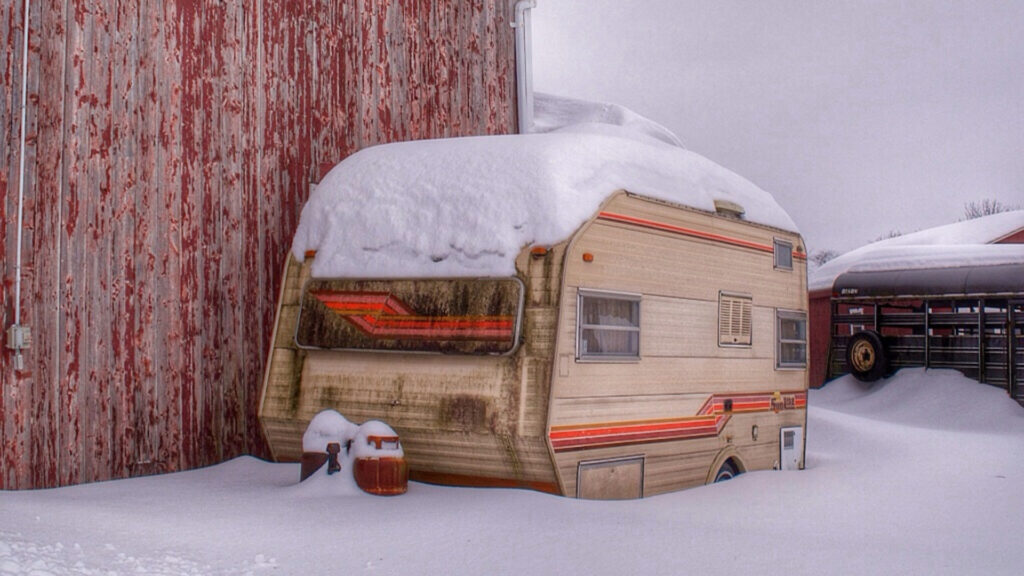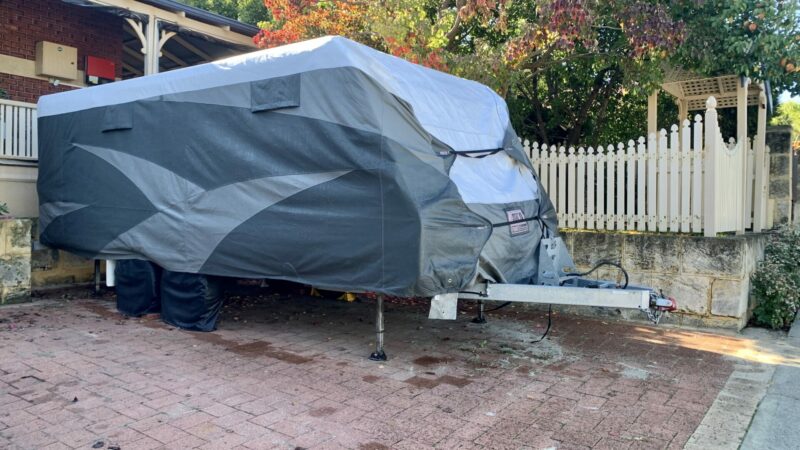Table of Contents Show
We spend good money on our RVs, so it makes sense that we work hard to protect them. There are many preventative products on the market, such as wax coatings, after-market locks, and insurance. One product RVers still debate is covers. Today, we’ll take a look at RV covers and whether they’re the right product for you.
What Are The Benefits of Having an RV Cover?
RV covers can be a great choice for many owners. Here are a few of the reasons you might want to make the purchase.
UV Protection
Sun can do a lot of damage to anything that sits outside. An RV that sits uncovered can end up with cracked and faded decals. The UV rays can also damage rubber roofs as they can shrink and pull away from the protective caulking.
Less RV Washing Time
Having your RV covered means less time washing it. A cover can help keep out bugs and bird droppings. RVs aren’t easy to wash. Using a cover means you need to do it less.
Keep Your RV Looking Great
Just like sticks and bricks homeowners, RV owners want their homes to look great. By protecting your RV between uses, you’ll keep it looking new for years to come. Keeping it covered can reduce accidental scratches while in storage.
What to Consider When Choosing an RV Cover
Not all RV covers are equal in quality or features. Here are a few things to keep in mind when shopping for your cover.
Size
Get a cover that fits just right. A cover that’s too big will shift, which can cause unnecessary damage. A cover that’s too small isn’t going to give you full coverage, meaning you won’t get the best protection. Take precise measurements, contacting your RV’s manufacturer if necessary.
UV/Water Protection
Not all covers provide UV protection. If UV protection is important to you, verify that the cover provides this protection.
You might also want water protection. Focus on selecting a cover that won’t allow water to seep in. If water gets trapped under your cover, it could create mold and mildew build-up.
Material
Some materials are better than others. Different price points will offer different material qualities. Scratchy tarp material is more likely to scuff your RV than softer materials. Most RV covers use polypropylene fabric or polyester.
Ease of Installation
The last thing you want is to struggle with putting the cover on. If your RV cover is a hassle to put on, it increases the odds that you’ll eventually abandon the process. Check out reviews for each cover you consider to see how others feel about it.

The Disadvantages of Using RV Covers
No product is perfect. You’re bound to find at least one thing you don’t like. Here are a few things that could frustrate you.
They Can Be Challenging to Install
Even the RV covers that claim to be easy to install take time. You might need friends to help. Putting it on correctly can be tricky, and an incorrectly installed cover can do more harm than good.
Cheap Options Offer Less Protection
It can be tempting to go cheap on an RV cover, assuming they’re all the same. As with many things, you get what you pay for. When working with a budget, you might not get the highest quality. Keep in mind that purchasing a lower-priced cover could mean a reduction in protection.
Possible Wind Damage
Poorly fitting RV covers can do a lot of damage. If your vehicle sits in storage for the winter, an improperly installed cover could flap around. This repetitive flapping can scratch your RV.
RV Covers for Roof Only
While many RV covers completely cover the vehicle, some only cover the roof, keeping it safe from the elements. The ADCO Roof Only Cover is a great option for those looking for roof-only coverage.
ADCO Roof Only Cover
The ADCO Roof Only Cover is both water-resistant and breathable. It attaches via anchors on the RV’s tires. This means it won’t touch the sides of the RV, which reduces the chances of damage. Roof-only covers take less time to install than full-body covers.
- Constructed using Dupont Tyvek for maximum durability and UV resistance
- Water resistant yet breathable
How Much Do RV Covers Cost?
The cost of an RV cover will depend on the size you need and the quality of the materials. If you have a small teardrop camper, you can likely find a suitable cover for just over $100. Those with large motorhomes are looking at $300 or more. There are, of course, many sizes between, so shop around if you’re on a budget.
Are RV Covers Worth the Money?
Those looking for long-term winter storage may feel they’re worth the cost and hassle. RVs that would otherwise be exposed to months of snow, ice, and wind could benefit from being covered. If you’re always on the go and your RV rarely sits still, you might not find it as useful, though.
We all do what we can to protect our RVs. Sometimes that also includes getting a cover. Do you feel RV covers help protect against the elements, or are they an unnecessary extra cost?
Last update on 2024-07-26 / Affiliate links / Images from Amazon Product Advertising API







